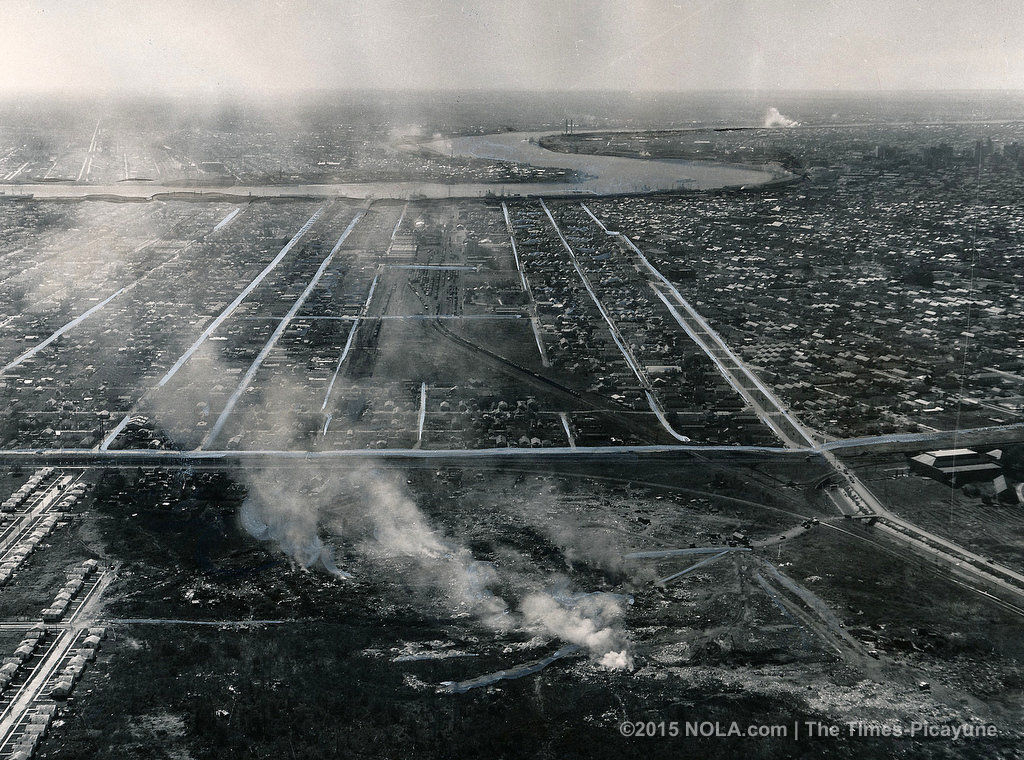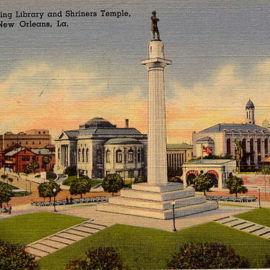
Gordon Plaza no longer looks like this but the the relocation has been approved for the residents to leave but when?
The effort to relocate New Orleans residents off the site of a toxic landfill continued to stall at a City Council committee meeting Tuesday set to discuss updates on the buyout process. Gordon Plaza residents urged city officials — and third-party contractors hired by Mayor LaToya Cantrell’s administration to mediate the relocation — to be transparent about the formula that will be used to determine how much they will be paid for their homes. For months, residents have pressed Council members, the City Attorney’s office, members of the Cantrell administration and the city’s contractors to use a metric known as “replacement cost” for determining how much the city will pay them out. They argue that other, more traditional appraisal metrics would be discriminatory. Due to the deflated value of their homes, the typical real estate appraisal process wouldn’t yield enough money to allow residents to stay in New Orleans. An analysis by Tulane University’s Department of Sociology, School of Architecture and a local real estate broker found that the median sales price for a home in Gordon Plaza since 2000 has sat around $72,000. A team of Tulane researchers determined that a full replacement cost per household would be about $500,000. Residents said Tuesday that Mayor Cantrell invited them to a meeting late last week, where a representative from her administration floated $245,000 as a potential buyout amount. But overwhelmingly, residents said that amount would not allow them to purchase a new home in the city — along with replacing their contaminated belongings and covering moving expenses. “It couldn’t buy me a house. It couldn’t move me out of my house,” Gordon Plaza resident Lydwina Hurst said. “So what you gonna do after that? Put me out?”
wwno.org
This has been a long process which makes these delays worse.
Following years of failed lawsuits against the city and persistent appearances at City Hall, Gordon Plaza residents won a major victory in June, when the city set aside $35 million from the capital budget to buy out and move residents off of the hazardous waste site. But that money has yet to reach the dozens of homeowners who continue to live there. Several Council members suggested Tuesday that part of the cause for the delay could be the Cantrell administration’s decision to hire an outside legal team to manage the buyout. In May, Council members and Gordon Plaza residents expressed concerns that third-party lawyers could be used to litigate against the residents rather than work with them. But city officials said they needed a third party to ensure the property acquisition happened legally. On Tuesday, Council member At-Large Helena Moreno questioned what role the legal team – the Law Offices of Sher Garner Cahill Richter Klein & Hilbert, L.L.C. – was playing in the relocation process. “It’s just not transparent as to how everybody is coming together on all this,” Moreno said, to the applause of residents. Representatives from Sher Garner were not at the meeting, but their subcontractors, the Butler Law Firm, and real estate appraiser Jim Thorn, were present. Council member At-Large JP Morrell said the city should have immediately gone to appraisers – rather than an outside law firm – when the relocation funding was allocated. “I think that there is so much frustration because where we are today, we should have been several months ago,” Morrell said.
Gordon Plaza has never been a fit place to live.
Located in the Desire neighborhood, Gordon Plaza is the last populated neighborhood on the former site of the Agriculture Street landfill, home to 67 properties. The area once hosted a public housing development called Press Park, a senior housing complex and an elementary school that were all shut down after Hurricane Katrina. After 50 years of operation as a landfill, the ground was laced with more than 50 hazardous chemicals, including arsenic and lead. Residents began to feel the health effects of living in the area within a decade of purchasing homes in the 1980s that were marketed as affordable housing for Black homebuyers. By 1994, the Environmental Protection Agency had declared it one of the most toxic Superfund sites in the country. Despite cleanup efforts, residents said they haven’t been free from illness and have pressed the city for relocation for decades. A renewed effort in the past two years has brought residents closer than ever before to a city-funded relocation. It’s still not clear what methodology the city will use to appraise the homes and set buyout amounts. Thorn, the appraiser working with the city, promised Tuesday afternoon that he would email Council members and residents details about the methodology that same evening, though residents said they were skeptical because past deadlines from lawyers and the city were not met. And Carl Butler, from the Butler Law Firm, said residents could view template documents, like purchase agreements from the contracted title company, on Thursday.
The residents are between a rock and a hard spot. Something has to change to speed their departure.



